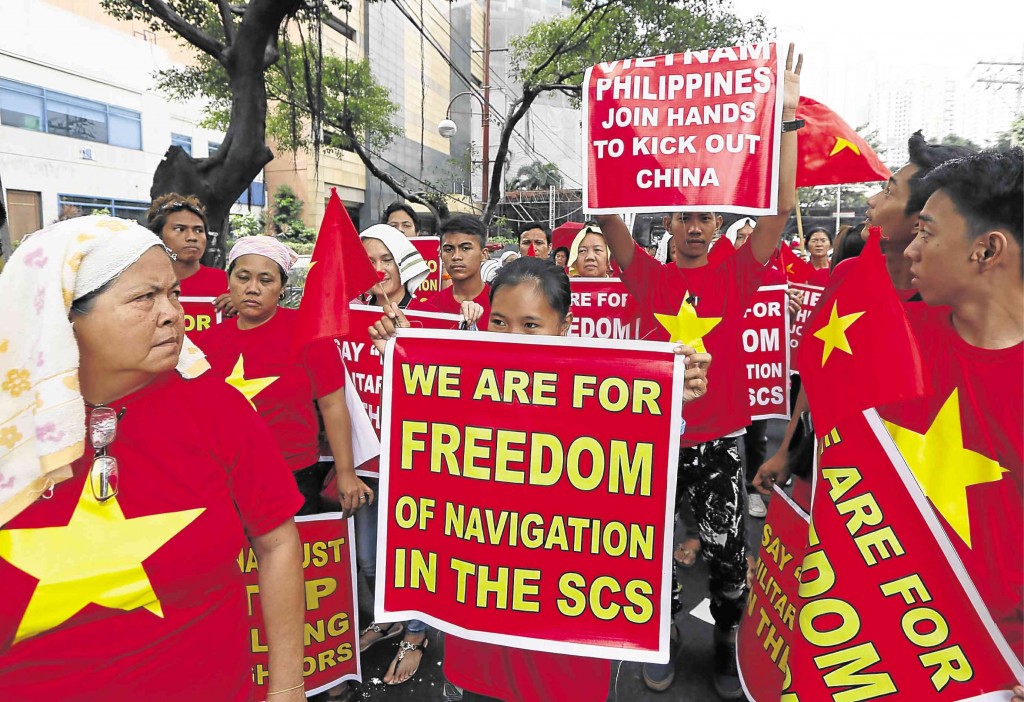US to step up South China Sea patrols

AGAINST CHINA Filipino activists, Vietnamese and other Southeast Asian students picket the Chinese Embassy in Makati City on Thursday to protest China’s increasing assertiveness in the South China Sea.
WASHINGTON—The United States, worried by China’s military buildup to assert dominance in the South China Sea, will increase freedom-of-navigation operations there, a senior Pentagon official said on Wednesday.
“We will be doing them more, and we’ll be doing them with greater complexity in the future and … we’ll fly, sail and operate wherever international law allows,” Adm. Harry Harris Jr., head of the US Navy’s Pacific Command, told a hearing of the House of Representatives armed services committee.
“We must continue to operate in the South China Sea to demonstrate that water space and the air above it is international,” Harris said.
On Tuesday, Harris said in comments coinciding with a visit to Washington by Chinese Foreign Minister Wang Yi that China was “changing the operational landscape” in the South China Sea by deploying missiles and radar as part of an effort to militarily dominate East Asia.
He said China was militarizing the South China Sea, “and you have to believe in a flat Earth to think otherwise.”
China insists its military facilities in the South China Sea are “legal and appropriate.”
On Tuesday, in an apparent reference to US patrols, Wang said Beijing hoped not to see more closeup reconnaissance, or the dispatch of missile destroyers or strategic bombers.
Candid discussion
Wang met with US National Security Adviser Susan Rice on Wednesday and they “candidly discussed” maritime issues, the White House said in a statement.
Rice emphasized strong US support for freedom of navigation and urged China to deal with regional concerns, the statement said.
China’s official Xinhua news agency said of the meeting that both countries believed all sides should work hard to maintain the peace and stability of the South China Sea.
“The South China Sea issue should be resolved via dialogue and peaceful means,” Xinhua added.
US deterrent
Harris, asked what more could be done to deter militarization, said the United States could deploy more naval assets, although there were significant “fiscal, diplomatic and political hurdles” in the way of stationing a second aircraft carrier group in the region.
“We could consider putting another (attack) submarine out there, we could put additional destroyers forward … there are a lot of things we could do, short of putting a full carrier strike group in the Western Pacific,” he said.
China claims most of the South China Sea, through which more than $5 trillion in global trade passes every year. The Philippines, Vietnam, Malaysia, Brunei and Taiwan have rival claims.
Harris’ comments came a day after he said China had deployed surface-to-air missiles on Woody Island in the South China Sea’s Paracel island chain and radars on Philippine-claimed Calderon Reef (international name: Cuarteron Reef) in the Spratly islands further to the south.
Disturbing trend
On Tuesday, Harris’ command said China’s repeated deployment of advanced fighter aircraft to Woody Island was part of a disturbing trend that was inconsistent with Beijing’s commitment to avoid actions that could escalate disputes.
Last month, a US Navy destroyer carried out a patrol within 22 kilometers of Triton Island in the Paracels, a move China called provocative.
The United States has also conducted sea and air patrols near artificial islands China has built in the Spratlys, including by two B-52 strategic bombers in November.
China and the United States have been trading accusations over militarization in the South China Sea, where islets, reefs and atolls are believed to be sitting atop vast deposits of oil and natural gas.
The rhetoric has heated up since it emerged last week that China deployed antiaircraft missiles on Woody Island, which is also claimed by Vietnam and Taiwan.
China denies it has aggressive intent. Its foreign ministry on Tuesday reasserted Beijing’s right to develop its South China Sea island outposts, saying it has sovereignty over them.
On Thursday foreign ministry spokesperson Wu Qian said China “really needs” its defenses in the South China Sea and accused the United States of militarization in the waterway.
“The United States is the real promoter of the militarization of the South China Sea,” Wu said.
“China’s construction of military facilities on the islands and reefs of the South China is really needed,” he said.
The Philippines, a US treaty ally, has challenged China’s excessive claims in the South China Sea in the United Nations Permanent Court of Arbitration in The Hague.
China has ignored the proceedings, but the court has proceeded to hear the case and is expected to hand down a ruling later this year.
On Thursday, the People’s Liberation Army Daily reported that China commissioned a domestically produced missile frigate this week.
The paper said the frigate, with a displacement of more than 4,000 tons, has powerful long-range surveillance and antiaircraft capabilities.
Ships of that kind can be used alone or along with other naval forces to attack enemy surface ships, the report said. Reports from the wires
For comprehensive coverage, in-depth analysis, visit our special page for West Philippine Sea updates. Stay informed with articles, videos, and expert opinions.